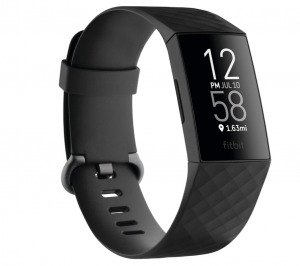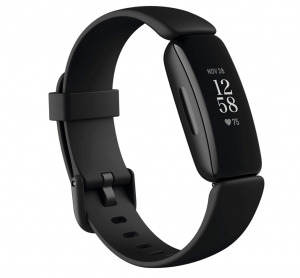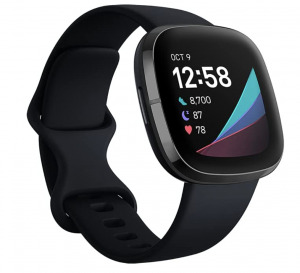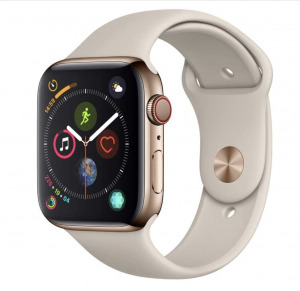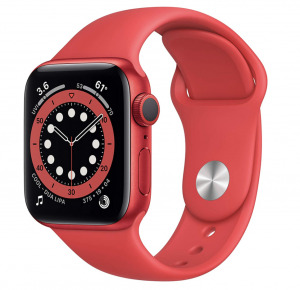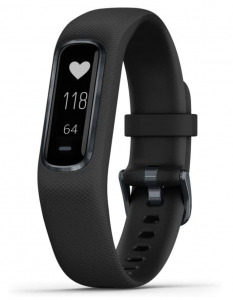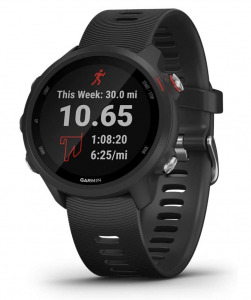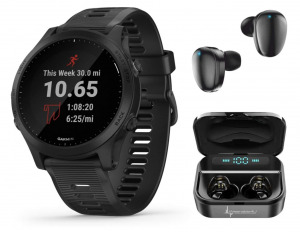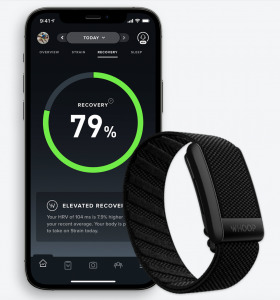Featured Image Source
When you ask most people to divulge their greatest fears, they identify things like loneliness, heights, even snakes or spiders. My response, though, is always a little different. Sure, spiders give me the heebie-jeebies, but I’m absolutely terrified of another S-word: spreadsheets.
So when, way back in the early aughts, I joined a running club and glimpsed at other members’ meticulously designed Excel files — documenting everything from time and distance to pace and heart rate from those clunky chest straps — I almost bolted in the opposite direction.
Those were the days when we all carried Nokia-brand cell phones, the weighty bricks built for the ancient art of calling, because texting wasn’t even a verb back then. If you wanted to track your exercise or athletic performance, you had to rely on a Timex stopwatch, then manually enter the data into your (shudder) spreadsheet.
Fortunately, we’ve come a long way since then. First there was the explosion of the original Fitbit tracker in 2009, which clipped on to your clothing and served as a basic step counter, so you could prove you were hitting your magical 10,000-steps-per-day target (which, it turns out, is actually quite arbitrary). Then came the wearable electronic wristwatches, which not only collected more activity data but synced to your fancy smartphone with then-newfangled Bluetooth technology.
And now? Manual spreadsheets, be gone: The latest-and-greatest gadgets automatically display your fitness data in simple tables and graphs that you can load up on your screen.
But don’t be fooled — these wearables aren’t just for fitness junkies anymore. Even if you’re not quite ready to plunge into a brand-new exercise regimen, activity trackers can at least provide you with valuable metrics to help you monitor your overall health. From sleep stats to period particulars, the newest watches on the market know more about you than you know about yourself.
Intrigued yet? Let’s dive into the nitty-gritty of these functionalities that could make your life happier, healthier, and downright easier.

Features To Look For
Heart-Rate Tracking
Anaerobic, aerobic, threshold, endurance…. Unless you’re an athlete, you probably don’t need to worry about the various heart rate zones. But even the average Jane can benefit from having a little bit of information about how hard her heart is beating. Your resting heart rate (RHR) can give you key clues about how healthy you are, with a lower RHR generally indicating better cardiovascular health. In the past, we had to put two fingers on our wrist to measure our pulse, but now your watch can do the work for you throughout the day. At any given time point, you can view your heart rate data from your tracker and see when it was at its highest and lowest.
Stress Tracking
Speaking of heart rate, a higher-than-normal value can suggest that you’re stressed. Your stress level can be even more precisely estimated with a metric called heart rate variability (HRV), or the variation in time between consecutive heart beats. In general, a higher HRV at rest is more favorable, as it indicates a lower stress level. Your top-notch smartwatch can measure that, too, and present you with an overall stress score to show you just how much you deserve that break to practice some deep breathing.
Sleep Tracking
You know the nights when you were sure to grab those elusive eight hours of sleep, but you still woke up feeling like a train wreck? Me, too. Your watch knows, also, that quality is more important than quantity when it comes to shut-eye. By tracking your heart rate and movement patterns overnight, these wearables tell you how long you spent in the different sleep stages — and how often you were tossing and turning instead. Many of the newer models even measure sleeping blood oxygen saturation — or Sp02 — to estimate how well you were breathing during slumber, or if you had bouts of sleep apnea. At the end of the night, you’ll receive an overall sleep score that reflects how well-rested you are, so you can plan your coffee consumption accordingly.
Hydration Tracking
I don’t need reminders to drink enough coffee in the morning — my body will scream at me if I don’t (and so will the people who endure my caffeine-deprived wrath). Water, though? I’m terrible at staying properly hydrated throughout the day, whether I’m sitting at my desk or grinding out a long run. Fortunately, my Garmin gadget is great at nagging me about my fluid intake. Basically, you can set up a daily hydration goal, add the containers that you typically drink from, and log your gulps accordingly. You can even compare your water intake to your heart rate data for some reinforcing stats, because dehydration is a key factor in elevated heart rate.
Menstrual-Cycle Tracking
Remember the days of marking down your period on your refrigerator calendar? I don’t — I hate calendars almost as much as spreadsheets — but I definitely had college friends who were fanatical about this chore. I was truly envious of their self-discipline, because they’d never have an emergency tampon situation, since they knew when to expect their impending Shark Week. Luckily, today’s snazziest smartwatches have an app for that, too. All you have to do is input the timing of your last period and the average length of your cycle; then your watch will always know how many days you have until you should stock up on chocolate and Midol. And if you do use your tracker for exercise, it’ll tell you whether to expect your training to flourish or feel like pure torture, based on the stage of your cycle.
2021’s Top-Notch Trackers
So many features, so little time: until the holidays, that is. ‘Tis the season when you deserve to splurge, especially after another long, lonely, pandemic-fueled year. Whether you’re jonesing to treat yourself or seeking a gift for your health-conscious bestie, the world is your oyster when it comes to electronic wearables. Here are some of our latest favorites, each with its own unique bundle of high-tech features to suit both athletes and casual consumers alike.
Fitbit Models
Fitbit Charge 4
Key Features: Built-in GPS, activity tracking, swimproof, 24/7 heart rate, active zone minutes, sleep & SpO2 tracking
Battery Life: Up to 7 days
Amazon Rating: 4.5 / 5 stars
Fitbit Inspire 2
Key Features: Built-in GPS, activity tracking, 24/7 heart rate, active zone minutes, sleep tracking/sleep score
Battery Life: Up to 10 days
Amazon Rating: 4.5 / 5 stars
Fitbit Sense
Key Features: Built-in GPS, activity tracking, 24/7 heart rate, ECG app, skin temperature sensor
Battery Life: Up to 6 days
Amazon Rating: 4.4 / 5 stars
Apple Models
Apple Watch Series 4
Key Features: Built-in GPS + cellular, automatic workout detection, activity tracking, swimproof, electrical and optical heart sensors, ECG app, fall detection and emergency SOS
Battery Life: Up to 18 hours
Amazon Rating: 4.7 / 5 stars
Apple Watch Series 6
Key Features: Built-in GPS + cellular, music, precision workout/activity tracking, swimproof, electrical and optical heart sensors, ECG app, sleep tracking, blood oxygen sensor, fall detection and emergency SOS
Battery Life: Up to 18 hours
Amazon Rating: 4.8 / 5 stars
Garmin Models
Garmin Vivosmart 4
Key Features: Activity timers, swimproof, sleep & SpO2 tracking, 24/7 heart rate, stress tracking, relaxation breathing timer, fitness/performance monitoring
Battery Life: Up to 7 days
Amazon Rating: 4.2 / 5
Garmin Forerunner 245
Key Features: Built-in GPS, music, heart rate monitor, fitness/performance monitoring, training status, custom workouts, incident detection
Battery Life: Up to 7 days
Amazon Rating: 4.7 / 5 stars
Garmin Forerunner 945
Key Features: Built-in GPS, music, heart rate monitor, fitness/performance monitoring, training status, custom workouts, maps, Garmin Pay
Battery Life: Up to 2 weeks
Amazon Rating: 4.8 / 5 stars
WHOOP Models
Whoop Band 4
Key Features: Sleep tracking, fitness/performance monitoring, recovery score, stress score, overall health monitor, strain coach, sleep coach, behavioral journal
Battery Life: Up to 4-5 days
SHOP – Free with WHOOP Membership ($30/month)
The Savings
Yeah, we totally get it — even the cheapest of these trackers can throw you into sticker shock at first. But before you go slashing important bills off your (ick) budget spreadsheet — which, unfortunately, a smartwatch can’t help you with — check to see if your health insurance company offers a discount on one of these devices. For instance, Blue Cross Blue Shield’s Blue365 Plan offers policyholders 20% off a Fitbit plus free shipping, and the Attain by Aetna program helps members subsidize an Apple Watch. Whatever plan you subscribe to, there’s a good chance your insurance offers some kind of incentive to monitor your health and fitness. After all, as they say, an ounce of prevention is worth a pound of cure.
Whether your 2022 health goals include qualifying for the Boston Marathon or simply savoring a more peaceful sleep, you don’t have to go after them alone. From Fitbit to Apple, Garmin to WHOOP, a smart companion on your wrist can give you a much-deserved pat on the back.

What are your favorite smartwatch features? Share in the comments!
For More Health And Wellness Articles, Read These:
Want To Start Working Out? Consider This Your Beginner’s Guide To Fitness
Walking Is One Of The Best Forms Of Exercise – Here’s How To Do It Right

